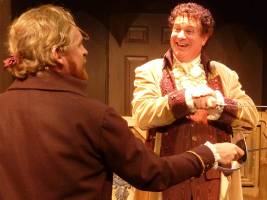RECOMMENDED
Were I to tell you I saw a play entitled Bach At Leipzig last night, you’d probably assume that it was some sort of epic historical drama. That’s certainly what it sounds like, right?
Think again. Itamar Moses’ Bach At Leipzig turns out to be a comedy, and not just a comedy. A laugh-out-loud screwball farce written with uncommon intelligence and originality.
San Pedro’s much esteemed Little Fish Theatre now tries its hand at this hysterical historical romp, and if the element of pomp is missing (and missed), there are still good reasons to check out this very entertaining (if bare-ish bones) production.
 To set the scene, the year is 1722 and some of the finest musicians of the age have descended on Leipzig, Germany, in hopes of succeeding Johann Kuhnau as organist of the Thomaskirche. Since no early 18th Century musician can achieve success without the patronage of the nobility or the church, a post like Kuhnau’s is one worth fighting for, even if this means lying, scheming, and double-crossing to obtain it.
To set the scene, the year is 1722 and some of the finest musicians of the age have descended on Leipzig, Germany, in hopes of succeeding Johann Kuhnau as organist of the Thomaskirche. Since no early 18th Century musician can achieve success without the patronage of the nobility or the church, a post like Kuhnau’s is one worth fighting for, even if this means lying, scheming, and double-crossing to obtain it.
Six musicians share the stage in Bach At Leipzig, all of whom happen to be named either Johann or Georg (one of the play’s myriad running gags), and none of whom has anywhere near the fame of the titular but conspicuously absent J. Sebastian Bach. They are:
Johan Friedrich Fasch (Bert Pigg), a virtuous, free-thinking, and oh-so romantic organist from Zerbst.
Georg Balthasar Schott (David Graham), the sour, conniving, tightly-wound, old-school organist at Leipzig’s own Neuekirche.
Georg Lenck (Cylan Brown) from Laucha, an habitual pickpocket, master forger, occasional cross-dresser, and too poor even to have a middle name.
Johan Martin Steindorff (Drew Shirley), a young Don Juan from Zwickau, whose string of mistresses is as long as Fasch’s list of endearments to his wife Anna.
 Georg Friedrich Kaufmann (Don Schlossman) from Merseberg, a feather-brained bumbler who has left his wife Gisela back home with only her gardener, her valet, and her footman to keep her company.
Georg Friedrich Kaufmann (Don Schlossman) from Merseberg, a feather-brained bumbler who has left his wife Gisela back home with only her gardener, her valet, and her footman to keep her company.
Johan Christoph Graupner (Garret Replogle), who arrives deliberately late from Darmstadt “to build the anticipatory dread of the others,” only to find that his five competitors have already left the room—par for the course for a man whose name is “so recognizable that many people think they have heard of me, without being quite sure.”
As these six organists plot, scheme, and connive to obtain Kuhnau’s coveted post, playwright Moses weaves thread after thread of running jokes, e.g. the “mysterious powder from the East” which Fasch is wont to inhale, a frequent mocking of anything not German (“We are not here to experience pure feeling! This is not Italy!”), and the conspicuous absence of “the greatest organist in Germany” (“Shh! Don’t say his name!”)
Another running gag is the “wild brigand” whose presence on the road to Leipzig has prompted the six musicians to conceal their musical scores in a variety of secret hiding places. Graupner, for example, informs us that “when I travel, I attach my scores to the flesh of my thighs with surgical thread,” a joke which not only gets laughs but leads to an amusing second act payoff.
Some of the jokes are straight out of Abbott & Costello in “Who’s On First” mode. Take, for instance, this exchange between Georg Schott and Johann Steindorff:
—I have a younger brother in Zwickau. Perhaps you know him? Johann?
—Perhaps. What’s his name?
—That is his name.
Other exchanges are classic burlesque as when Schott asks Fasch “What brings you here?” and gets the response, “Stagecoach, primarily.” Or when Schott tells Steindorff, “I was hoping to have a word,” and the latter after some thought responds, “Cantankerous.”
There’s even occasional cattiness that would do All About Eve’s Addison DeWitt proud, as when a claws-out Steindorff tells Kaufmann “Your understanding of politics is as nuanced as your music.” (Kaufmann of course takes it as a compliment.)
Moses’ script is not merely funny but also exceedingly smart. Take for example Steindorff’s remark that “a halfhearted show of diplomacy is the final step toward open war,” or when Schott responds to Fasch’s “Why must everything have a name?” with a simple but profound “So that we know which houses to burn.”
Comparisons between religious denominations of the era—Lutherans, Calvinists, and Pietists—are as illuminating as they are humorous, as is Fasch and Schott’s discussion of innovation vs. craftsmanship or whether music should be a means of religious expression or exist simply for its own sake.
Moses has constructed Act One as a fugue, something which becomes clear in Act Two’s inspired opening sequence, yet another of Fasch’s letters to his beloved Anna, this time describing the musical construction of a fugue. As Fasch reads the letter, the other five characters replay the entire first act in mime, following precisely the rules that Fasch is explaining.
Stephanie A. Coltrin directs Bach At Leipzig with accustomed panache, and if there was occasional uncertainty with lines at the performance reviewed, it should be noted that this was the pre-Opening Night invited dress rehearsal.
 Coltrin has assigned each role with considerable care, providing her cast of South Bay favorites some terrific parts to play. With a bit of tightening, Pigg and Graham are on their way towards creating two deliciously different rivals. A terrific Schlossman makes Kaufmann the dolt you can’t help but love, and never more so than in Act Two when he comes to the joyful but erroneous conclusion that the interaction between his fellow musicians is a play entitled The Undeniably Credulous Fool … which he most certainly is. Shirley is a scene-stealing Steindorff, Brown’s light-fingered Lenck is another standout (and looks quite fetching in a dress), and Replogle could not be funnier as the ever shortchanged Graupner. Completing the cast is Ted Escobar, making several wordless appearances as “The Greatest Organist In Germany,” oft described by the other characters as having a splendid speaking voice—which we never hear.
Coltrin has assigned each role with considerable care, providing her cast of South Bay favorites some terrific parts to play. With a bit of tightening, Pigg and Graham are on their way towards creating two deliciously different rivals. A terrific Schlossman makes Kaufmann the dolt you can’t help but love, and never more so than in Act Two when he comes to the joyful but erroneous conclusion that the interaction between his fellow musicians is a play entitled The Undeniably Credulous Fool … which he most certainly is. Shirley is a scene-stealing Steindorff, Brown’s light-fingered Lenck is another standout (and looks quite fetching in a dress), and Replogle could not be funnier as the ever shortchanged Graupner. Completing the cast is Ted Escobar, making several wordless appearances as “The Greatest Organist In Germany,” oft described by the other characters as having a splendid speaking voice—which we never hear.
Where Bach At Leipzig at Little Fish will fall short for anyone who has seen previous productions, whether at South Coast Rep or The Old Globe or the 99-seat Odyssey, is in its costume design and the conspicuous absence of period wigs. Do a Google image search and you’ll see how the characters are supposed to look—richly brocaded coats, elaborately frilly collars, breeches revealing knee-high stockings, and period shoes with extravagant buckles. At Little Fish, costume designer Claire Townsend gives us some of this, though the men’s full-length trousers seem particularly anachronistic. As for hair design, early 18th Century men the stature of these Johans and Georgs would never have gone out in public with their real hair showing, and much of the fun in Bach At Leipzig comes from seeing Men In Wigs Behaving Badly. Though some attempt has been made to create a period hair look at Little Fish with real or attached pony tails, Graham’s stylish short cut is circa 2012 plain and simple.
Should Little Fish have decided not to stage Bach At Leipzig because budgetary limitations made elaborate costumes and wigs impossible. Certainly not. Do these shortcomings affect performances? Perhaps to a certain extent, since clothes do make the man, as actors often discover the first time they don period costumes and realize how it informs their characters. Can these costume and hair imperfections be completely overlooked? With a play as unique in setting and style as Bach At Leipzig, probably not.
Other design elements prove far less problematic. Scenic designer Christopher Beyries’ simple but effective set provides a suitable church antechamber for Bach At Leipzing to unfold on, one which Darrell Clark lights with accustomed expertise. Sound designer Holly Baker-Krieswirth fills Little Fish with glorious early 18th Century Bach at opportune moments (though sound cue tightening will make for increased laughter whenever the door into the church gets opened or closed, for reasons explained in the script). Joining forces, Clark and Baker-Krieswirth give us one of Bach At Leipzig’s signature moments. (Whenever one of the characters releases a carrier pigeon and watches it ascend, the sound of wings and wind and accompanying flash of light provoke steadily building laughter.) Act Two features Patrick Vest’s thrilling swordfight choreography as well, particularly for those seated close-up.
Bach At Leipzig is produced by Amanda Karr. Debbie Ortiz is stage manager.
Ultimately, even though Bach At Leipzig may be one of those plays where size (of budget) really does matter, you probably shouldn’t let this stop you from catching it at Little Fish. Even in this relatively no-frills production, Moses’ 18th Century screwball farce provides plenty of laughter from start to finish.
Little Fish Theatre, 777 Centre St. San Pedro.
www.littlefishtheatre.org
–Steven Stanley
September 20, 2012


 Since 2007, Steven Stanley's StageSceneLA.com has spotlighted the best in Southern California theater via reviews, interviews, and its annual StageSceneLA Scenies.
Since 2007, Steven Stanley's StageSceneLA.com has spotlighted the best in Southern California theater via reviews, interviews, and its annual StageSceneLA Scenies.







 COPYRIGHT 2025 STEVEN STANLEY :: DESIGN BY
COPYRIGHT 2025 STEVEN STANLEY :: DESIGN BY